Text
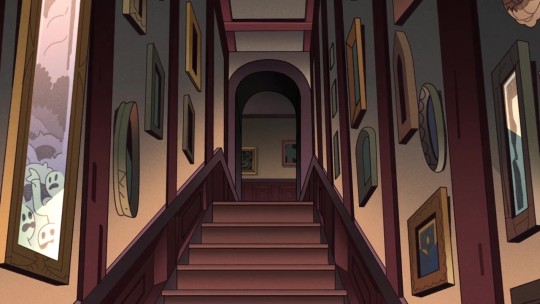

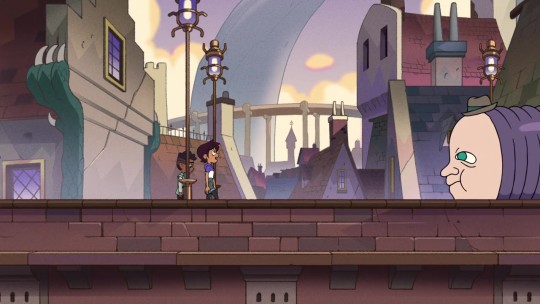
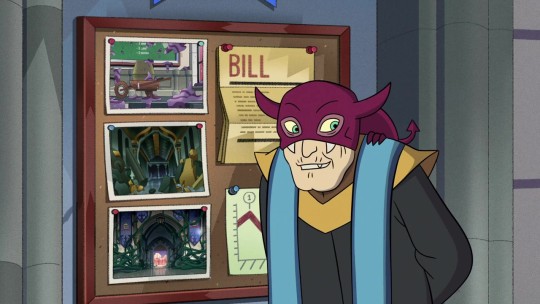
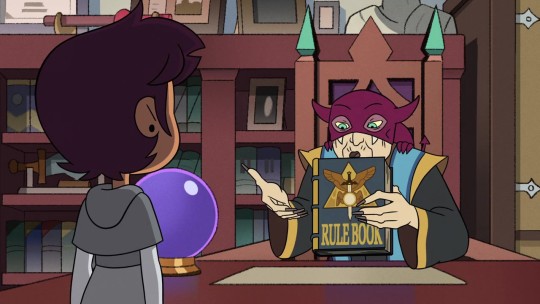


Compliation of TOH's references/FORESHADOWING to past or future episodes...
S1E01 foreshadows S2E03: King's shadow looks like the stone people
S1E01 foreshadows S2E21:
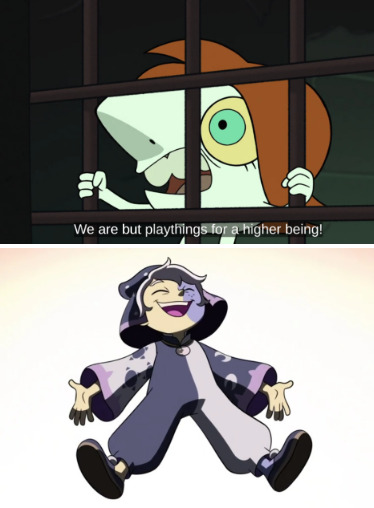
S1E02 references S1E03: This is what I think, the painting shows abominations and vines, which reference Willow's vines stabbing Amity's abominations in ep3
S1E02 and S2E05 reference S1E08: You can see Dead Man's Curve - the road where Boscha races "Luz" - in the background of Bonesborugh
S1E07: "Now we're stuck together forever"
S1E13 references S1E03 and S1E09: the damage to the school
S1E13 and S2E02 reference S1E03: Bump's dagger seen in his office is the same one used to almost disect Luz
S1E13: eda sock puppet having mismatching eyes foreshadows how eda will lose her magic in S1E19
S1E15 references S1E11: the picture of Tiny Nose
S1E16: amity and luz in the mud: them holding hands foreshadows how theyd do that again for the dance during grom
S2E10: fortune teller
S2E21: eda taking off her arm at the start of the episode foreshadows that she will lose an arm later in the episode
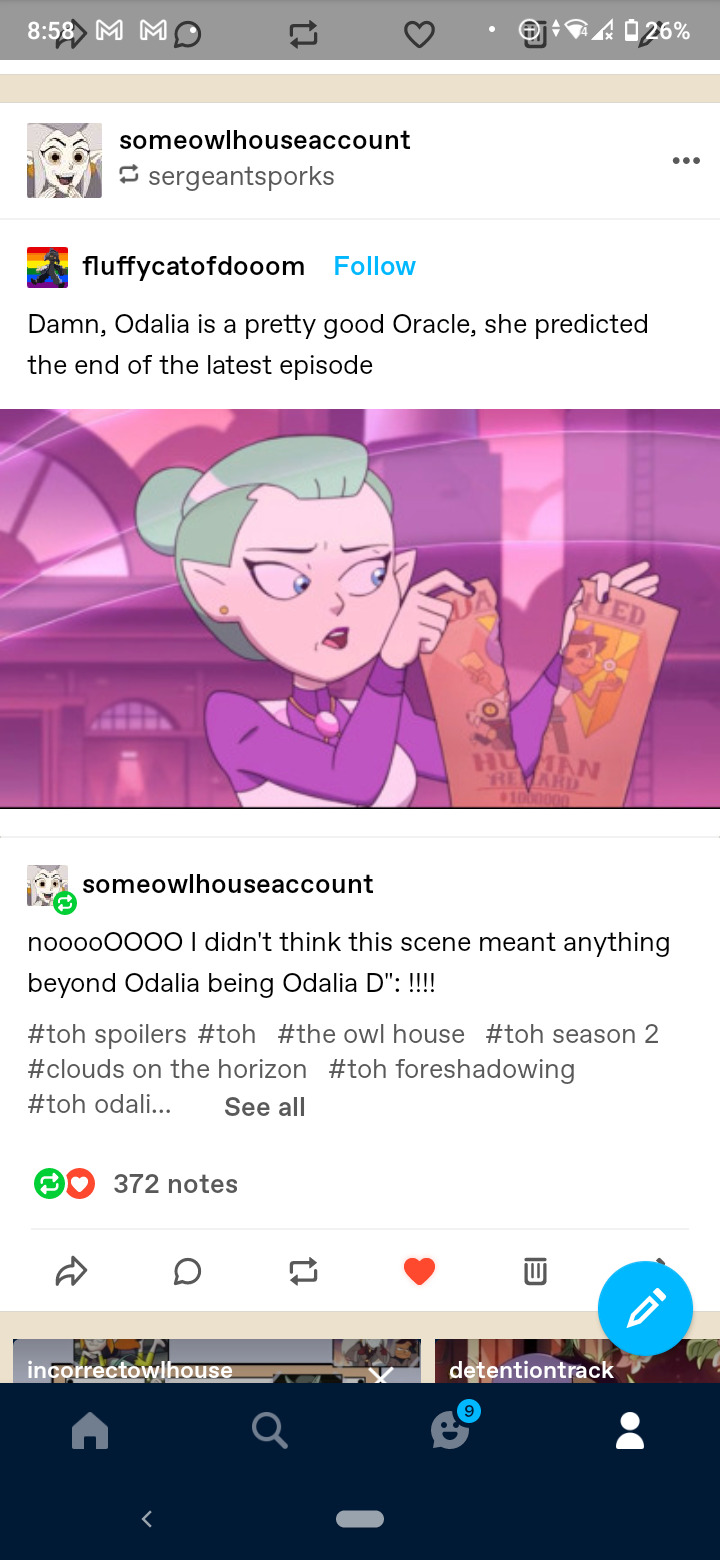
S1E17 -> S2E07: Raine covered photograph in Eda's memories book
S1E08, S2E17 -> S2E21: coven glove can force-put a coven on you
"this mama is ready for trauma": foreshadowing that Liz is gonna get some trauma :') *points to multiple episodes*
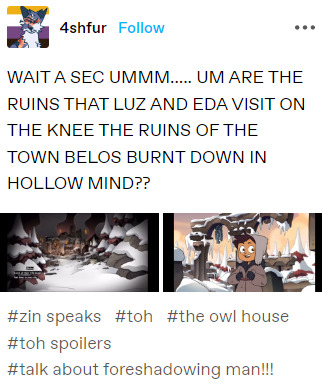
S2E13 -> S3E1: hunter green mark
7 notes
·
View notes
Text
The Owl House And Restorative Justice
At the end of Season 1 of The Owl House, it is revealed that Lilith, the main overarching antagonist of that season, was the one to curse her sister Eda, one of the protagonists, to win a tournament when they were teenagers. This information causes Eda to fly into a screaming rage and attack Lilith, and understandably so.
Eda’s curse is essentially a chronic illness, one that, in Eda’s own words, has ruined her life, being the reason she’s considered a social outcast and why, before meeting King and Luz, she hadn’t gotten close to anyone in years. In season 2, it’s revealed that the curse is why she pushed away her partner Raine to the point that they broke it off with her, and that during a particularly bad flareup, she accidentally maimed her own father, leaving him half blind and with permanent nerve damage to his hands, making him unable to continue working as a Palisman carver. The curse has ruled Eda’s life for decades now, so to Eda, this is the ultimate betrayal.
In the first episode of Season 2, Lilith has defected from the Emperor’s Coven, split the curse between Eda and herself to mitigate the symptoms for her sister, and has moved in with Eda at the Owl House. While Lilith herself still feels guilty and feels she has to make it up to Eda, everyone else, Eda included, has seemingly either forgiven her or chosen to look past it. Eda even makes fun of her for feeling bad about cursing her, and Lilith’s guilt is seemingly absent for the rest of the series.
The response to this was… Less than stellar, shall we say. A lot of people were angry, saying Lilith got away with her crimes without even a slap on the wrist, and that Eda’s forgiveness of her was far too sudden.
This isn’t the first time we’ve seen this kind of critique. Amity spent years bullying Willow after her parents forced her to break off their friendship, and when she began trying to mend that relationship, the response from fans was that Willow should have been a lot more angry at Amity, and that they went back to being besties far too soon. I’ve even seen this criticism leveled at Hunter for the things he did while working for Belos, at Vee for impersonating Luz for months to trick her mother, and at Luz for hiding the fact that she helped Philip find the Collector from her friends. And it does seem strange for the show to keep tripping on this same point again and again.
Except, it’s not really. Because I think that, when viewing this show from a different angle, those supposed flaws are actually symptoms of something very important to understand – The Owl House operates on a system of crime and punishment that is very different from our world’s.
More specifically, our world mostly utilizes retributive justice. The world of The Owl House utilizes restorative justice.
So first, what do those terms mean? Broadly, they’re two different forms of handling interpersonal disputes, or dealing with crime.
Retributive justice is the one our current justice system uses, where the focus is primarily on punishing the perpetrator. Retributive justice can mean detention, suspension, expulsion, jail time, monetary fines, some kinds of community service, exile, or in more severe cases, corporal punishment or the death penalty. It’s the lens most people view the world through, where if someone hurts you, hurting them back is the correct response.
Restorative justice is a very different approach, where you instead focus on helping the victim recover from what happened, and rehabilitating the perpetrator to prevent this from happening again. Restorative justice can look like verbal or written apologies, monetary compensation for costs and trauma, therapy for both victim and perpetrator, education for the perpetrator, mediation between victim and perpetrator, a restraining order, etc.
When viewed through a retributive lens, The Owl House lets its characters get away with a lot of shit. Lilith cursing Eda, Hunter rounding up Palismen knowing they’ll be killed, Amity tormenting Willow for years, it’s all stuff that, in a retributive environment, they should be punished for, and they’re just not. Eda is only genuinely angry at Lilith for two scenes, Amity and Willow fix their relationship very quickly once Amity starts making amends, and Hunter isn’t punished at all.
However, I believe the story of The Owl House is best viewed not through a retributive lens, but through a restorative lens.
Let’s look at the Lilith-example again. Lilith’s offense was cursing Eda, which she did because she wanted to win a spot in the Emperor’s Coven. Knowing Eda was better than her, she cast a curse on her, thinking it would only last for a day. But when the time came, Eda forfeited the match, soon after which she transformed into the Owl Beast and was pelted with rocks until she ran. The curse turned out to be very permanent, and Lilith spent the next 20 years trying to fix her mistake by working for Belos to try to capture Eda, since he promised to heal her curse.
However, when she finally succeeded, Belos went back on his promise. Instead of healing Eda, he ordered her to be publicly executed. When Lilith protested, Belos essentially told her to shut up, that it was the Titan’s will, and left her there.
So, having realized her method of fixing her mistake has gone real bad, Lilith sneaks down to the Conformatorium to free Eda herself, but arrives too late and finds Luz instead. After a brief fight they end up teaming up, and Lilith leads Luz to the elevator, but they are captured by Belos and Lilith is thrown into the cage with Eda. There, she restores Eda’s partially petrified body, and after fleeing with her, Luz and King, uses a spell to split Eda’s curse evenly between their two bodies.
From a restorative justice point of view, Lilith has done pretty much everything she reasonably could do to fix things. She’s denounced the Emperor’s Coven, returned Owlbert to Luz, helped Luz find the elevator to the execution platform, saved Eda from petrification, apologized to Eda, and while there’s no way for her to cure Eda’s curse entirely, she took on half of the curse at great expense to her own health, in order to ease Eda’s symptoms.
Eda isn’t angry anymore because in her eyes, Lilith has already fixed things with her. Punishing her more at this point is pointless. What more could Lilith do, really? What other lessons could she learn? The only thing that punishment would bring at this point would be more suffering.
Let’s look at another example: Amity and Willow.
Amity’s offense was breaking off her friendship with Willow because she was a late-bloomer, bullying her for years, and allowing her friends to do so too. Willow is left with horrible self-esteem issues because of this, and combined with her failing grades, turned her into a horribly shy and withdrawn wallflower (no pun intended). After she’s moved to the plant track she starts actually getting better, but Amity and Boscha especially continue to torment her. While Amity’s bullying of Willow does peter out over time, Willow is clearly still extremely resentful of her. In an attempt to make Willow forget their friendship, Amity accidentally sets most of Willow’s memories on fire, leaving her confused, amnesiac, and unable to grasp basic concepts like that chairs are for sitting in.
Luz pushed Amity into fixing Willow’s brain by going into her mind together and piecing her memories back together. There, the Inner Willow revealed what happened to Luz and the audience.
At this point, Amity shows her that her parents were actually the ones who forced her to end the friendship because they didn’t think Willow was a suitably powerful or influential friend, threatening to make sure Willow would never get accepted into Hexside if Amity didn’t force her to leave. Amity then apologizes to Willow for going along with it, and for the bullying, and vows to make sure her friends never mess with Willow again.
Willow accepts her apology, but also makes it clear that, while it’s a start, she’s not yet ready to accept Amity in her life again. Restorative justice has not been fully attained, because to Willow, Amity hasn’t fixed everything – Boscha and her squad are still bullying her, and still consider Amity one of them. This changes two episodes later, when Amity tells Boscha to grow the fuck up when she starts bullying Willow again, and joins her and Luz’s Grudgby team despite her personal issues to get Boscha to back off. Willow doesn’t make a grand gesture of forgiveness in this episode, but it is after this point where the two become comfortable around eachother again.
Did Willow forgive Amity too quickly for years of trauma? Maybe. If she had chosen to continue keeping Amity at a distance I certainly wouldn’t have blamed her. But in the end, Amity fixed the mess she caused as best she could, and has proven herself to want to be a better person, to want to be Willow’s friend again. She worked hard to prove herself to be a person worth trusting, and Willow decided to give that trust a chance again.
And while they did become friends again, that friendship was clearly still affected by what happened, which led to bumps that the two of them had to work through. Like in Labyrinth Runners, where Amity’s overprotectiveness over Willow makes Willow feel like Amity thinks she’s incompetent, and still only sees her as the helpless person she used to be.
Willow continuing to be mad at Amity and punishing her for what she did wouldn’t be an unreasonable reaction, but it wouldn’t have fixed anything. It would certainly have an impact on Amity, seeing her former best friend rejecting her attempts to make up for what she did, but the hurt on both sides would have continued festering, because deep down, Willow missed Amity too.
In Hunter’s case, there’s the question of whether he can even be held responsible for his actions. The Palisman-kidnapping in specific was explicitly done under duress – if he failed he would face verbal and physical abuse, and be threatened with his nightmare scenario: getting thrown out of the Emperor’s Coven.
And that’s not an empty threat either. Hunter has no magic, and Belos has drilled it into him that witches without magic have no future. Without the Emperor’s Coven, his only future prospects would be starving to death on the streets or wasting away in prison. Either way, Hunter would be alone, without family or friends, without a job or job prospects, without anyone to turn to for help. Any child would be terrified of that. Hunter wasn’t always acting on direct orders – in fact he defied direct orders to stay in his room in Eclipse Lake to go look for Titan’s Blood, and then again in Hollow Mind to arrest the rebels. But he made those choices based on the idea that Belos wouldn’t want him if he was a failure, and that he needed a chance to prove that he could still be useful.
And contrary to popular belief, Hunter does know right from wrong. He has a very strong moral compass, he’s just been forced to ignore it in favor of doing whatever the Emperor wants. To shut up that little voice telling him he’s doing the wrong thing, he uses what’s called a thought-terminating cliche, a statement that feels so fundamentally true that the argument need not continue. In Hunter’s case, that statement is “It’s for the greater good.” Sure, kidnapping his new friends and abducting Palismen to feed to the Emperor and threatening someone who’s been nothing but kind to him to take the portal key from her girlfriend and justifying terrorism makes his stomach feel like he swallowed a cactus and saying it out loud makes him sound like a horrible person – but it’s for the greater good. He’s doing it to serve Belos, and Belos knows what’s best.
So by the time Hunter is out of active danger and able to rest and recover from what happened to him… what would further punishment accomplish? He already knows that he did fucked up shit while working for the EC, and he’s proven time and time again that while he’s not fighting for Belos’s approval, he’s actually a genuinely kind-hearted kid. Punishing him now would likely cause him to react very poorly, because he’s been at the wrong end of that stick so often that he’s developed severe PTSD because of it.
And if you think restorative justice is still in order – Hunter is currently hyperfixated on making sure Belos can never hurt anyone again, and for the long term, he has expressed that he wants to become a Palisman carver when he grows up. While it won’t bring back the Palismen that were killed, it will help the current Palisman population recover and reintroduce Palismen to witches who may have had to give up theirs.
When viewed through this lens, the writing of The Owl House starts to make more sense. As a show, it is extremely forgiving towards its characters – they’re still held accountable for their actions, but as long as they’re willing to grow and learn and fix the damage they caused, they are very quickly forgiven.
However, I do understand why these writing choices can be… controversial, so to say. Because it doesn’t feel very satisfying, does it? When someone hurts you on purpose, your first impulse would be to try to hurt them back, that’s just how people work.
That’s the hardest thing to come to terms with when you become an advocate for prison abolition for example – you’re not just arguing for freeing a guy who got 5 years because a cop found weed in his pockets, you’re arguing for the release, and most importantly, the humanity of some of the most vile, disgusting people this planet has ever produced. Even now, when someone commits a truly awful crime and gets sent to prison for life, my first thought is “Good, I hope they rot in there.” But that’s not justice. That’s just revenge. And revenge is not something we as a society should want to build our justice system on.
It’s not satisfying to see Lilith go from using Luz as a human shield in her fight against Eda to sleeping on the couch in Eda’s house within 2 episodes. It’s not satisfying to see Willow let Amity back into her life when Amity has hurt her so badly before, or to see Hunter become romantically involved with Willow after he literally abducted her the first time they met. But that satisfaction isn’t really the point. Revenge is satisfying in the moment, but an eye for an eye makes the whole world blind, and if someone shows a genuine willingness to change, it’s often better to give them a chance to.
However, my final point is about what happens when this approach fails. Because not everyone is willing to change. Some people, when faced with the consequences of their actions, decide to dig their heels in and refuse to admit fault, or blame the victim(s), or use those same thought-terminating cliches that Hunter used to justify their actions, “I was just following orders” being a big one.
And thus, we come to Belos.
If Belos showed a willingness to change, a genuine one, not an attempt at manipulation, should he be given the chance to? That vengeful part of me is VERY empathetically saying no. But logically, reasonably, he should be given that chance, if only because he’s a human being and no human being deserves to be mistreated. That doesn’t mean his victims are obligated to forgive him or be around him again, in fact I think that, for the sake of Hunter’s mental health, Belos should stay as far away from him as humanly possible. But he should be given the chance to start over, to truly better himself and do something good with the rest of his life.
But Belos isn’t willing to change.
Belos is a product of a bad environment and grew up with a cult-like mentality and hatred for witches that he had to adopt for his own safety. It’s hard to break out of that mentality, but not impossible. Case in point: Caleb. The tragedy of Belos’s character to me is that he had so many chances to change, so many people to help him make that leap, but all of the people who offered him that help ended up dead by his hands because he couldn’t handle the idea that he may have been wrong.
At this point, Belos is stuck. Changing would mean not only giving up on his life’s work, but acknowledging to himself that everything he’s done, mutilating his body, killing his brother, slaughtering thousands and installing himself as God-Emperor of a population he despises more than anything in order to facilitate a genocide, was completely pointless.
He can’t admit that to himself. Especially the thing about Caleb’s death. He’s sunk-cost-fallacied himself so far into a corner that all he can really do when faced with opposing viewpoints is dig his heels in even deeper and lash out in a rage at anyone who challenges him. Even now, when his body is literally falling apart at the seams, he’s still trying to commit witch-genocide, because it’s all he has.
Restorative justice doesn’t work in this case, because the perpetrator needs to be receptive to it. Logically you would assume the show would default to retributive justice, and characters like Willow and Camila do take a very vengeful glee in imagining themselves beating the snot out of Belos. But right now, the primary motivation of the Hexsquad and Hunter in particular when it comes to Belos is to end the threat he poses. As long as Belos is alive and free, he will continue to hurt and kill people, and if he can’t be talked down, he needs to be either contained or killed to prevent him from causing more harm.
The Owl House provides, in my opinion, a very nuanced take on restorative justice. It shows how it works in action, how different situations impact what it looks like, and what happens when it’s simply not an option. It’s not the most satisfying story to tell your audience, because when someone hurts our babies we want them to suffer, no matter how sorry they say they are. But in this case, I think that sacrificing that bit of audience comfort is worth it to tell the story like this.
#ooo i feel like im back in my philosophy 139 class#restorative justice was really interesting#when i started learning about it#i was thinking#yes!!! rehab for criminals instead of prison so that they can become better people#instead if just sit in jail for X years to make the rest of us happy!#but then you realise how not everyone would actually change their ways if given the chance#and then you like restorative justice a bit less because if you apply it to those people then it wont actually do anything#so now youve just let a criminal go through rehab that didn't work and they didn't even get punished at all#very unsatisfiying#but as u said#1) its not meant to be satisfying#2) you dont actually have to use this justuce system on ppl if it won't actually work (belos)#3) it DOES work on a lot of people (amity lilith hunter)#so it should be used to help those people improve their lives :)#toh meta#the owl house meta#toh#the owl house#toh analysis#toh lilith#toh amity#toh hunter#toh belos
3K notes
·
View notes
Text
King probably told Eda that Luz got injured but it’s gonna be an oof when they see her again and she has a scar on her face. Jeez. It’s gonna be funnier when they’re like “wow Luz, you have a scar” and then Hunter walks by and they’re like “… oh… :| ….”
591 notes
·
View notes
Text
i want the blight family to be aware that odalia is currently the servant for a child in an environment that won't treat her seriously or listen to her aspirations
they wont be surprised that odalia is with the collector, but i want them to know about it :)
#toh spoilers#toh#the owl house#toh season 3#for the future#toh odalia#i was gonna say 'the rest of the blight family'#but then i realised that the blight family has only 3 people#the blights consist of 4 people but the blight family consists of 3 people
11 notes
·
View notes
Text

The real character development
#i like to imagine this as the different amities are looking at each other#amity 1 is generally angry w everything bc she hasnt discoverd how to be happier yet#amity 2 looks at amity 1 and thinks 'oh wow my life back then kinda sucked huh'#amity 3 is just the girl who didnt get the role for disgust on the inside out movie#toh#the owl house#toh season 3#toh amity
139 notes
·
View notes
Photo
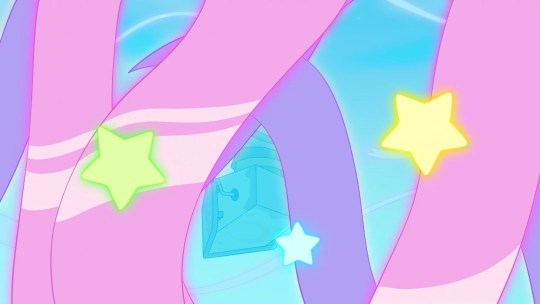
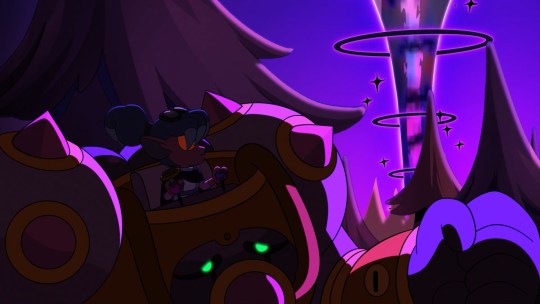
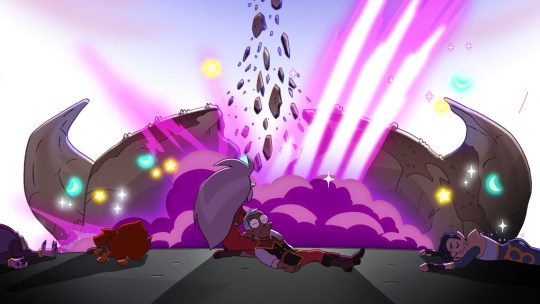
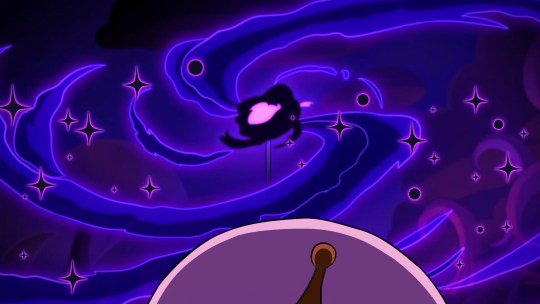
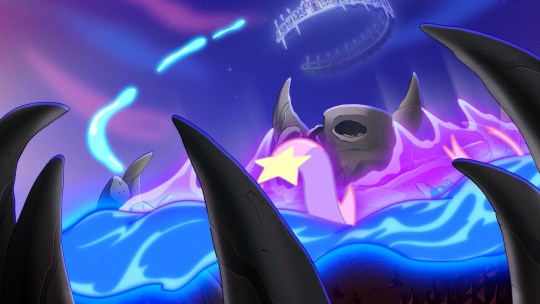
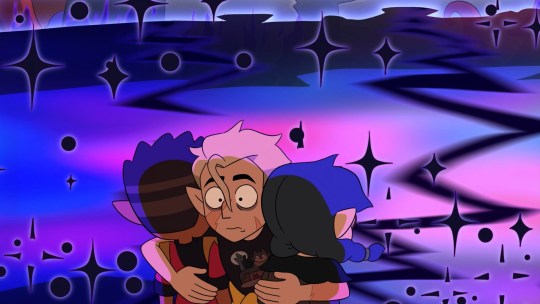
I love how Collector’s and Luz’s magic are the opposite of what you would have expected from protagonist and antagonist!
Collector’s is bright and colorful and Luz’s is dark and deep purple.
His sparkles are white and her sparkles are black!
And both have pinks and blues as secondary colors!
#oh i love this#toh spoilers#toh#the owl house#toh season 3#for the future#i didnt notice that luz's magic even has sparkles :o
25K notes
·
View notes
Text
5 Biggest Revelations in For The Future
#5
"Tholomule" is a last name
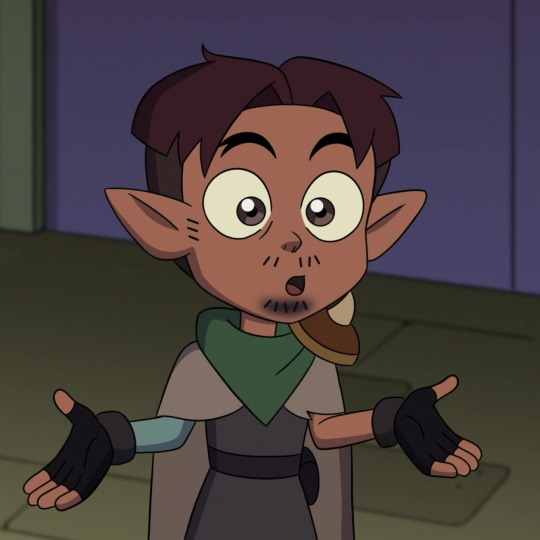
#4
Hexside doesn't have a proper school council

#3
(my personal fav) The roadside eye goop can make sounds

#2
Kikimora is confirmed to have teeth!

#1
Hooty has a blue and pink polka-dot bowtie :D

#this blog will forever provide the best owl house analysis#toh spoilers#massive owl spoilers#you have been warned#toh#the owl house#toh season 3#for the future#roadside eye goop
27 notes
·
View notes
Text
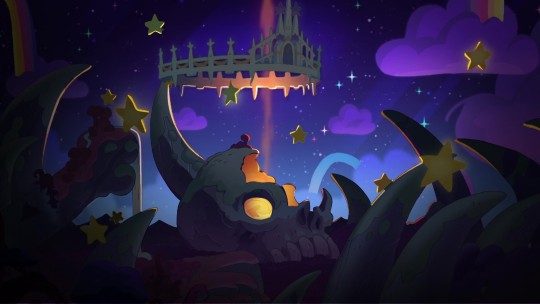

oh yeah and i saved these screenshots :) the orange one is my new desktop wallpaper
#toh spoilers#toh#the owl house#toh season 3#for the future#toh titan#toh screenshots#cartoon backgrounds
46 notes
·
View notes
Text
I can't be the only one who thought of achievement sounds when they went to the titan skull
#toh spoilers#toh#the owl house#toh season 3#for the future#toh video#this took way too long for me to make
3 notes
·
View notes
Photo
awwwwwwwwwwwwwwww its got little teeths its so cuddly

Stringbean!!!
#toh spoilers#toh#the owl house#toh season 3#for the future#toh fanart#toh stringbean#toh luz#its midnight and i have class in the morning
107 notes
·
View notes
Text
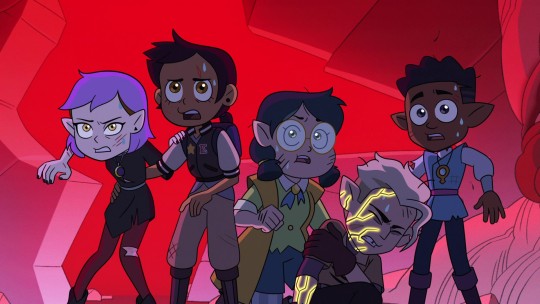
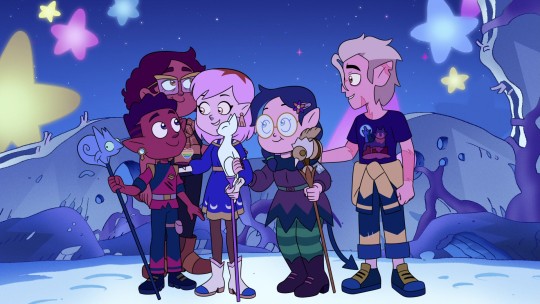
The previous time they were in the titan's skull VS the latest time!
12 notes
·
View notes
Text

just reminding myself what happened last episode
2 notes
·
View notes
Text
things you can deduce from the thumbnails for the first two episodes of season 3
episode 1
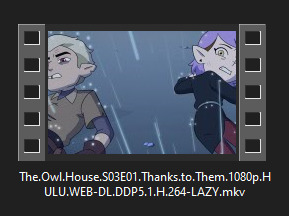
we are back in the human realm D:
episode 2

we are back in the demon realm :D
hold on what's that

is that somehow titan fur or does the collector have the titan's body under some kind of magical forcefield or something right now
i should just click on this
#toh#the owl house#toh season 3#my point for this post was i like how both episodes immeaditely remind u what happened in the last one bc they change dimension each time#is episode 3 gonna be held solely in the green realm o_o
2 notes
·
View notes
Text
Something I think is neat is how Amity gets so much better at abominations AFTER her grades begin to dip.
She’s spent her whole life doing her absolute best to get the best grades and be the top student, but she is wholly unable to create powerful abominations. She needs a power glyph to make a threatening one in early season 1. She’s doing everything ‘right’, but it���s not helping her, because she’s straining herself on keeping up with academic nonsense and her spirit is crushed by having no real connections to anyone.
And then, in season 2, in Escaping Expulsion, Odalia notes that Amity’s grades have fallen. But Amity is so much happier with the genuine connections she’s made! She’s been finally made to feel like she wants to be more than what her mother wants of her, and she wants to be happy. And that likely means not sacrificing every waking moment of her life to school anymore. It’s not something she can keep up with when she knows she wants more, and deserves more. And despite the dropping grades, she’s thriving! For the rest of the season and show, she’s easily creating abominations at the same level or higher than what she used to be able to create only with a power glyph. She’s able to do so much more when she’s able to be herself, recharge, and relax with people who genuinely like her for her
Tldr: Amity’s focus shifts from solely academics to including elements of self care and self love over the course of the show, and without the intense mental strain of being a perfectionist student, she can actually thrive in her magic studies
#personally i didnt notice amity's abomination style being very different to other people's#maybe i just wasnt paying attention idk#but i like this!#if youre learning something in your own way and are motivated to learn it then thats def more important than getting top grades for it#uh i lost my train of thought bc my parents are now playing fast tetris music#toh#the owl house#toh season 2#toh amity#oh yeah and happiness > grades :)
2K notes
·
View notes
Photo
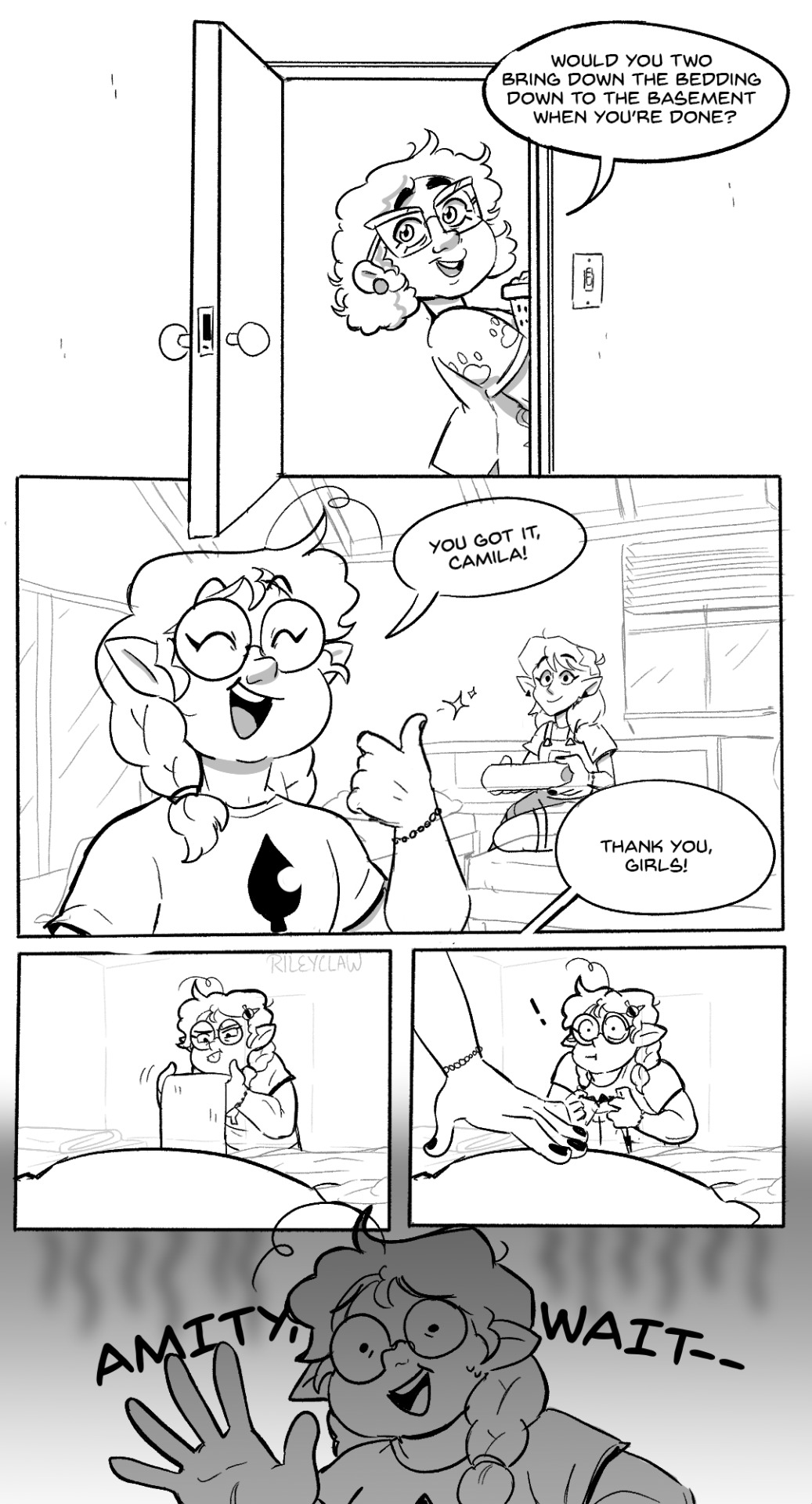
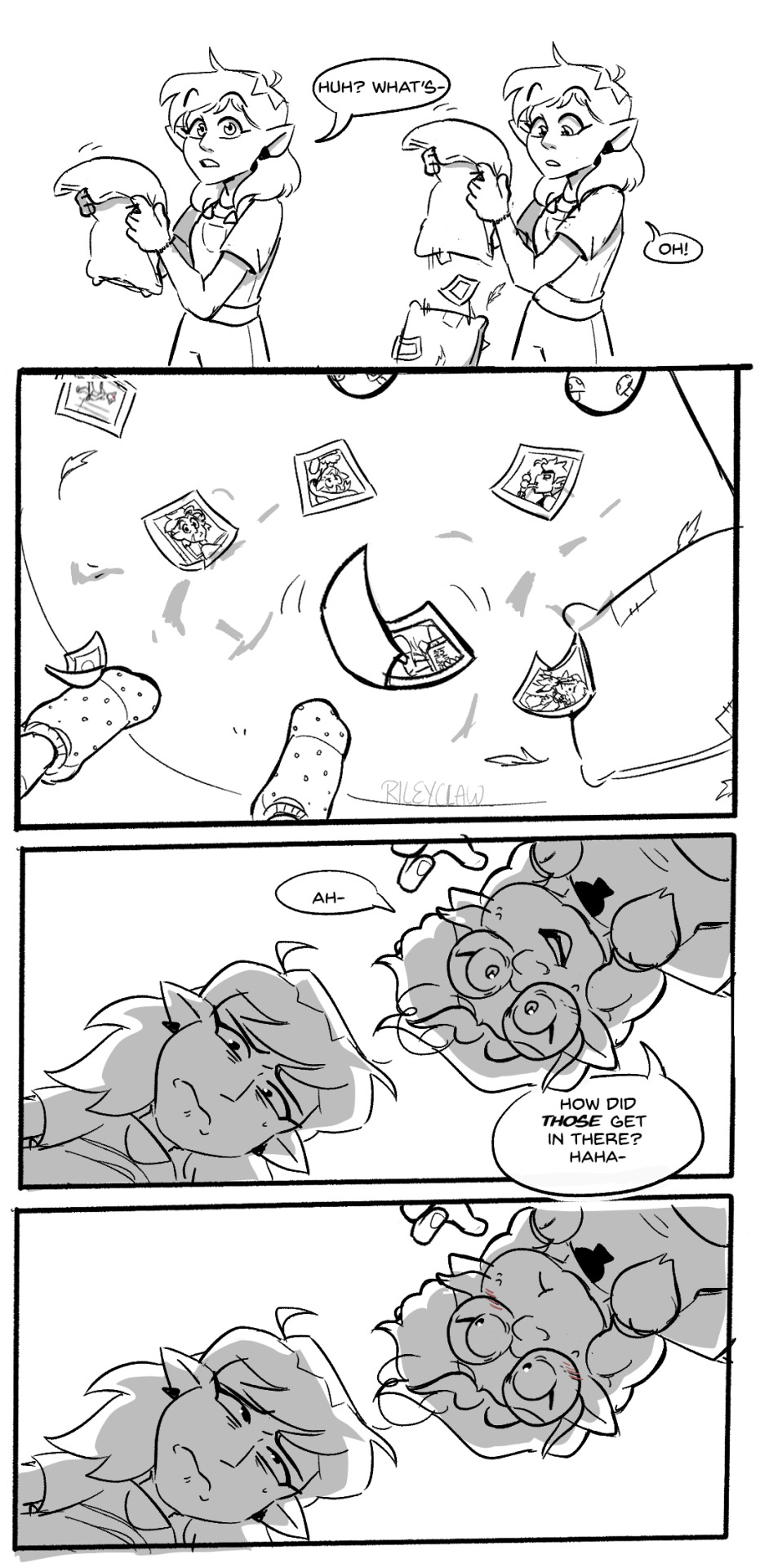
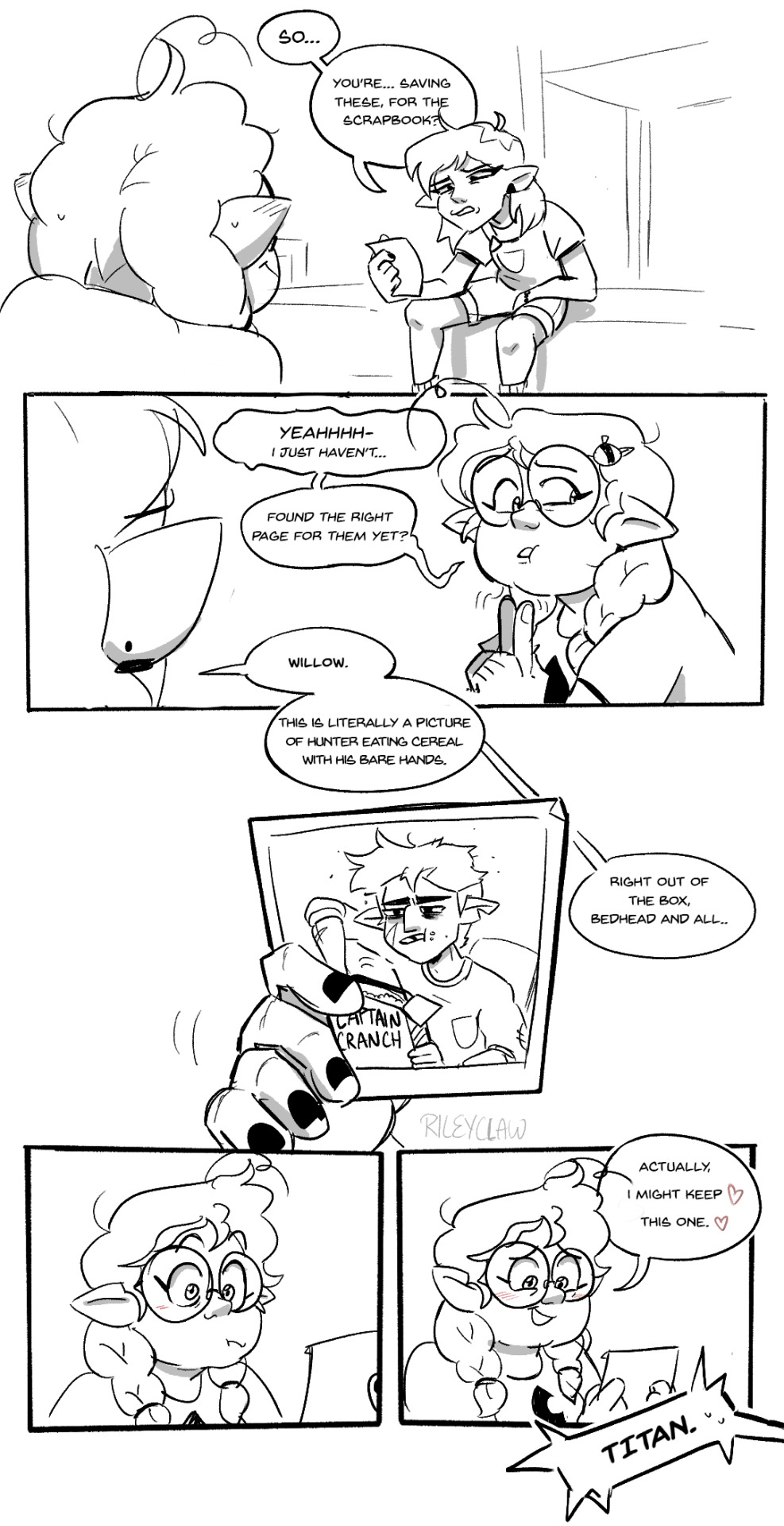
she’s so lame
bonus. actually they both are
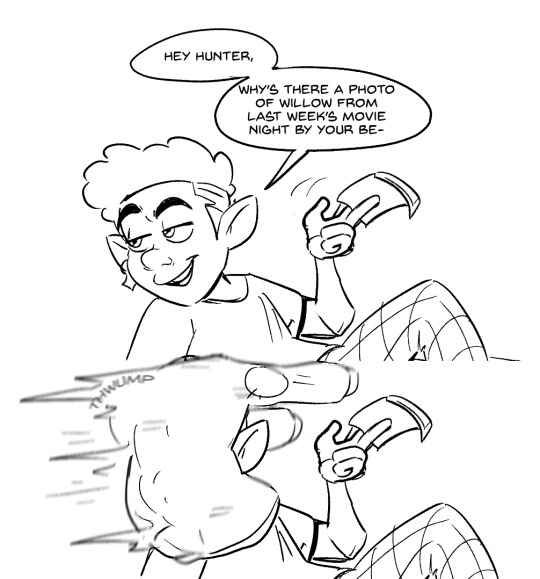
#i love these guyses photos#one of my fav minor features from thanks to them (:#toh#the owl house#toh season 3#toh fanart#thanks to them#toh willow#toh amity#toh hunter#toh gus#huntlow
20K notes
·
View notes
Text

:)

gus time
9 notes
·
View notes
